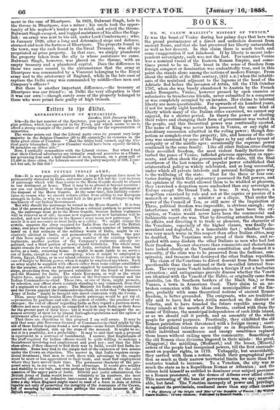THE FUTURE INDIAN ARMY.
Silt—It is now generally admitted that a larger European force must be permanently stationed in India, and some alarm is felt lest the vast increase of patronage which will thus accrue to the Horse Guards should be abused to our detriment at home. That it may be so abused is beyond question ; nor can our liability to that abuse be avoided if we place the patronage at the disposal of the Horse Guards. At the same time this liability consti- tutes no reason why we should refrain either from adding to our European strength in India, or why we should halt in the good work of improving the machinery of our Indian Government.
But why should the patronage be vested in the Horse Guards ? It is true that if the present plan of treating India as a colonial garrison be persevered in, the patronage must go to the Horse Guards, because Indian regiments will be relieved as of old ; because new regiments or new battalions will be needed, and new battalions in the Queen's army mean new patronage. Yet surely it is not necessary to treat India as a colony. We might change the system separate the army required for India from the rest of the British army,
system, place the patronage elsewhere. A certain number of battalions, based on a fair estimate of the military wants of India, might be ex- clusively allotted to India, and permanently stationed there. One part of this force might consist of a given number of the existing Queen's regiments, another portion of the Company's regiments already or- ganized, and a third portion of newly-raised battalions. The whole army might remain for ever as the garrison of India, recruited from home, but never, as a body, returning home. It might be made liable to no service out of India, except in case of emergency, when it might be employed in Persia, Egypt, China, or in our island colonies in those regions, or except in case of danger to British power, when it might be employed anywhere. Such an army might be supplied vrith officers either from some college established for the purpose, or even as they are now supplied by nominations to cadet- ships, proceeding from the prepared substitute for the Board of Directors and the Minister for India. The whole European, as well as the whole Native force, might be under the orders of the Governor-General and the Indian Commander-in-chief. These two or one of them, might promote, by selection, any officer above a certain standing to any command, from that of a regiment to that of an army. The Minister for India might nominate and the Crown appoint the Commander-in-chief, in order that the Queen's Army of India" might be brought into direct connexion with the Crown. Thus; many things besides Horse Guards patronage would be got rid of, —promotion by purchase and sale • the system of reliefs ; the practice of ex- changes ; the evil of officers' regarding India as they regard a garrison-town. Officers and men would again be compelled to look upon India as their home for the greater part of their lives : but it would be easy to mitigate the as- sumed severity of their lot by liberal furlough-regulations aad the option of retirement after a given penod of service. That there are objections to this proposal I am well aware. It may be said that some able Governor-General or Commander-in-chief might by the aid of these Indian legions found a new empire—some future Ellenborough, seated on an elephant, ride up the steps of the musnud. It might be so; but it is a possibilty, not a probability. It may be said that such a proposa is equivalent to a sentence of banishment. I answer, that Englishmen of 'the staff required for Indian officers would be quite willing to undergo a banishment involving real employment and good pay; and that the idler class alone if they chanced to find their way to India, would find India in- tolerable. 'Some may find in the simple fact of the existence of two armies under the Crown an objection. The answer is, that India requires excep- tional treatment ; that men to work there with advantage to the empire must be more or less apprenticed to their trade, and must find employment where they have served their time. The permanent character of the .pro- weed army is, in my eyes not its least advantage. It would give solidity and stability to our rule /end even perhaps lay the foundation for the colo- nisation of the upper palls of India. Strictly and justly administered, the British Army of In,d1. would becom relatively to its numbers, the most powerful offensive or defensive instrument in the world : and there may Item A day when England might stand in need of a foroe in Asia of Africa tarpable not only of preserving the integrity of the dominions of the Crown, lSI3 Of securing by extensal action perhaps the essential interests of the


























 Previous page
Previous page